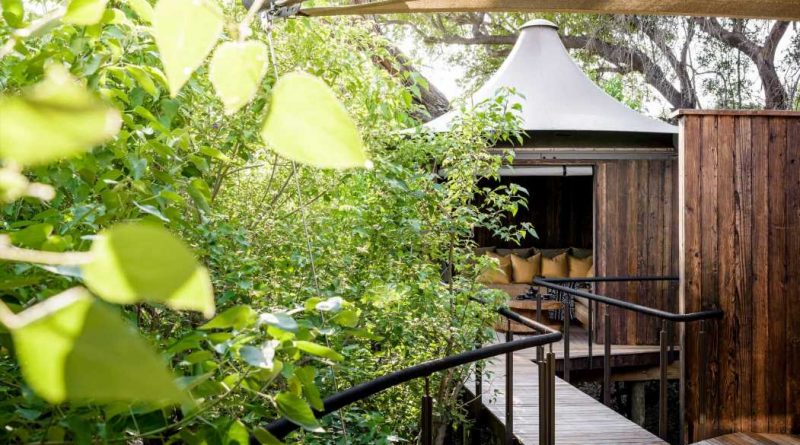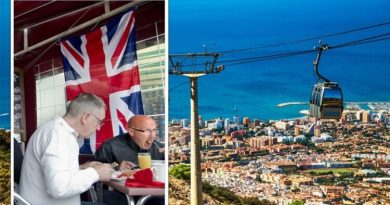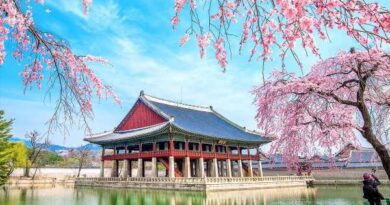Botswana's Xigera Lodge Has a Light Footprint and a Major Impact
The Okavango Delta smells of wild sage and damp earth. Cotton-wool clouds hang low in the sky, and thunder rumbles softly, like elephants trumpeting in the distance. From the air, the blue-green tapestry of water channels and islands spreads out like a giant hand. Three years in the making, Xigera Safari Lodge is located at the very center of this alluvial fan, on the western edge of the Moremi Game Reserve. Even during the last gasp of sultry Botswana summer, before the flood surge from Angola, 650 miles away, it is still possible to take a mokoro canoe trip through the lily-dotted shallows. Eventually, the waters disappear into the sands of the Kalahari Desert, producing hundreds of seasonal pans and lagoons that are an inland paradise for birds. Predators and prey are concentrated on islands, providing some of the greatest wildlife encounters in all of Africa.
Xigera is arguably the most anticipated recent opening on the continent. It’s the latest addition to Red Carnation, the boutique hotel collection that is part of the Tollman family’s travel empire, which also includes Ashford Castle in Ireland, The Milestone in London, and a trio of properties in South Africa. Xigera’s history dates back to the 1980s; it was the very first camp opened by legendary safari operator Wilderness Safaris. When the Tollmans, who were longtime Wilderness board members, parted ways with the company in 2018, they took Xigera with them. Their plan for the safari lodge was to reinvent it as a model for operating sustainably in the middle of nowhere.
Botswana’s eco-travel roots run deep. Private concessions in the Okavango Delta are leased under strict environmental guidelines. Anything that may potentially contaminate the waterways is a no-go, including building with concrete, cement, and bricks. Although the area covers 2,000 square miles, there are only about 1,000 beds, resulting in a level of privacy that is almost impossible to find anywhere else in Africa. The country’s low-impact approach to tourism has kept its wild expanses exclusive and pristine, justifying its high price tags.
The reborn Xigera represents the next chapter in Botswana’s story. Its 12 new elevated suites, most facing the floodplains, still blend into the hardwood forest, but that’s where any similarity to the original ends. Dinners feature spicy Durban curry prepared with local bream and wines from a cellar stocked by the family’s Bouchard Finlayson estate in South Africa. There’s a state-of-the-art gym, a pavilion for sunrise yoga, and a baobab tree house for sleeping under the stars. The spa menu makes liberal use of Tata Harper’s farm-to-face products.
But for all its luxury, what most differentiates Xigera is its energy conservation, achieved with the latest Tesla solar-hybrid system, supplying the lodge with 95 percent of the required power. According to the project engineer involved, using renewable energy will save an estimated 19,300 gallons of diesel and prevent the release of about 421,000 tons of carbon emissions annually. The Tollmans’ future plans include introducing solar-powered electric game-viewing vehicles.
A commitment to human sustainability runs in tandem with these efforts, with a focus on preserving cultural heritage and supporting community-owned artisan businesses. The family tasked 80 talented makers across Africa—including wood-carvers, sculptors, ceramists, and glassblowers—to create an ambitiously scaled gallery of functional and decorative African art for the lodge. Sculptor Adam Birch produced about 150 large-scale wood sculptures from fallen timber found on location, with local carpenters working alongside him. Chuma Maweni, a master of hand-thrown ceramics, made more than 70 unique pieces from black clay—each pedestal, lamp, and coffee set unique in its shape, color, and patterning.
Many other items at Xigera were made from reused materials. For a patio, sculptor Conrad Hicks fashioned a giant firepit from repurposed steel. Furniture designer Jesse Ede used recycled aluminum for the outdoor dining tables, while Xandre Kriel’s armchairs incorporate rubber from an old conveyor belt. Eye-catching circular works by Chris Soal, made from beer-bottle caps, appear in each suite. Almost everything you touch or see was crafted by hand; many objects are one-offs. Age-old traditions have been preserved and elaborate production elevated to its rightful place. The Tollmans’ investment in limited-edition art, each piece grounded in Africa, has resulted in a timeless collection. In an industry sometimes guilty of over-refurbishing in an effort to enchant the next generation of travelers, Xigera puts an intelligent new spin on what it means to be truly sustainable.
Rates from $2,320 a night per adult, meals and activities included; xigera.com
This article appeared in the April 2021 issue of Condé Nast Traveler. Subscribe to the magazine here.
Source: Read Full Article



